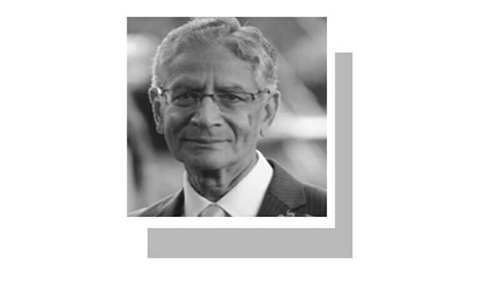No alternative to democracy
IT would be wrong, perhaps, to see too much in Christina Rocca’s views about the relationship between the war on terror and the safety of nuclear weapons on the one hand and President Pervez Musharraf retaining his uniform on the other. But a clearly different perspective seems to emerge from what the US assistant secretary of state told Pakistani journalists at a question-and-answer session on Tuesday. Ms Rocca said she believed a free and fair general election, a level playing field for elections this month and in 2007, and a full return to democracy were essential for Pakistan’s long-term stability and progress. Pakistan, she said, was a moderate (Muslim) country. Previously, Washington had shown complete indifference to the uniform question. It accepted President Musharraf’s “election” as head of state and regarded him — perhaps rightly — as the key partner in the war on terror. But the newly placed emphasis on a fair and free election and a full return to democracy seems to constitute a new element in America’s perception of Pakistan’s domestic situation. The reference to nuclear weapons assumes importance because of the concern expressed by Indian Prime Minister Manmohan Singh during his American tour last month.
As a superpower, America thinks it has a right to tell us how to organize our affairs. Sometimes, the advice is gratuitous; sometimes it is sought, as the proceedings of the video session show. Essentially, it is our fault that we have to be lectured on the ABC of democracy — like holding free elections, giving an even playing field to all, and moving towards “full democracy”. We have been playing ducks and drakes with it. Had we not done so, we would not have had such gratuitous advice coming our way so often. Our tragedy has been that our rulers have attempted to ram down people’s throats such absurdities as “basic democracy” and “shooriyat” and so on which have held us back.
The system crafted under the LFO and the Seventeenth Amendment is likely to last till 2007, but that will mean nothing in terms of the progress we need towards full democracy. If at all 2007 is to be a turning point in the nation’s quest for democracy, the concept of a level playing field needs to be applied in a way that does away with some of the abhorrent features of the mauled and defaced Constitution. First and foremost, clause 58-2b needs to be done away with. The president’s power to dismiss an elected government is incompatible with the imperatives of democracy and constitutionalism. Second, the nation will not put up with another “king’s party”. The 2002 elections were geared to the success of the “king’s party”, and even after the elections a thoroughly artificial coalition was cobbled together to keep the PPP and PML-N out of power. The methods used in the process included bribing and browbeating MNAs to form breakaway groups and cross the floor so as to create an artificial pro-general majority in the assembly. The amendment to the parties act forbidding floor-crossing was made only after the PPP-Patriots had come into being and were ensconced in power. Notwithstanding the appropriateness of Ms Rocca’s views, we need to give up reservations about democracy. There is no alternative to it as all the wild experiments since 1958 have clearly shown.
Increasing crop yield
SENIOR officials from the ministry of food, agriculture and livestock and the Pakistan Agriculture Research Council (PARC), who met at a seminar in Islamabad the other day, were only half right in pointing out that increased research in agriculture could help Pakistan achieve self-sufficiency in food. The fact is that the yield per acre in Pakistan for many crops is significantly lower than, say, in India, where the yield for wheat in Haryana and Punjab is 50 per cent higher. Apart from the fact that research in agriculture has not led to any major breakthroughs in crop cultivation or productivity, and that it is not relevant to the needs of farmers growing the major crops, there are several other reasons why Pakistan lags behind.
For example, the availability of water, prevention of desalination and water-logging, and the judicious and timely use of fertilizers and pesticides have been a problem. Even when the rains do come on time, the water is not properly utilized for irrigation because of dwindling storage capacity. The practice by many farmers of overusing pesticides or of using fertilizers at inappropriate times (normally because of shortages), and a low level of mechanization prevent a more effective use of the land under cultivation. There are also other problems, such as poor seed quality, improper soil management, inappropriate crop protection methods, lack of credit for farmers and fluctuating support prices that the government promises to farmers, all of which combine to create a dismal situation as far as agriculture productivity is concerned. The sector makes up a quarter of the country’s GDP and also happens to be the largest employer of the labour force. That alone should be enough for the government to devote more resources to agriculture research so that crop yields can go up. This also means monitoring the quality of work undertaken by the PARC and to ensure that the fruits of its research are disseminated among the farmers in an effective way. This can be best done by having mobile teams which travel the rural areas and take the relevant information to the doorsteps of the farmers.
Prisoner violence in Sukkur
PRISONER violence broke out yet again in Sukkur Central Jail, which was also the scene of similar rioting last May. In the latest episode that occurred on Monday in Central Jail I, the prisoners held 22 jail staff hostage, accusing them of harsh treatment, extortion, and of seizing their possessions during prison searches. These complaints are not very different from the ones behind the May episodes, making it clear that the jail authorities have failed to take corrective steps since then and carry out their duties with regard to discipline and humane treatment of prisoners. An inquiry had been conducted after the previous two incidents of rioting and some jail officials were suspended. But that step was primarily meant to allay the grievances of the prisoners and prevent further lawlessness. No wonder it has not worked. This is hardly surprising especially when abysmal jail conditions exist not only in Sukkur but in prisons all over the country.
It is unfortunate that little has been done to rectify the existing prison conditions beyond making calls from time to time for the revision of the jail manual and setting up inquiry teams to look into the causes of prisoner violence. What is needed is a major overhaul of the existing prison system. In addition to regular jail visits by independent citizens to check and report on prison conditions, steps must be taken to expand jail premises to reduce overcrowding, ensure easier and speedier access to justice and the induction of a more honest and efficient jail staff capable of maintaining discipline. But most important, perhaps, is the need for us to revise our perception of prisoners and to view them not as congenital criminals or as aberrant individuals but as products of a largely corrupt and unjust society. Such a view would help transform our Dickensian prison system into reformatories based on the concept of humane treatment of prisoners along with proper living conditions for them.













































